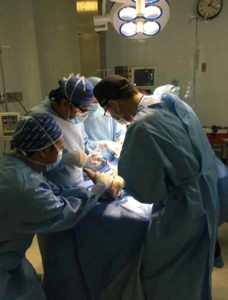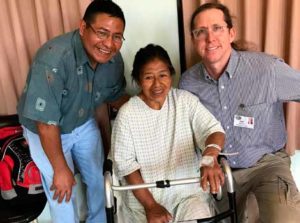Experience from two careers enhances mission to Guatemala-Dan Dickover
Daniel Dickover, cst, chi
Daniel was one of the 2016 Medical Mission Assistance Award recipients from the
Foundation for Surgical Technology.
 I began my adult life as a Spanish medical interpreter in Milwaukee in 1999. I loved the variety of procedures and patients I saw at a large medical center. The first surgeries
I began my adult life as a Spanish medical interpreter in Milwaukee in 1999. I loved the variety of procedures and patients I saw at a large medical center. The first surgeries
I witnessed as an interpreter were cataract removals with lens implants. The patients were only sedated, so we had to be present to make sure they were positioned comfortably and
remained still for the procedure. I was enthralled by all the procedures in the OR and was advised to “stay away from the blue.” I once tried to “spin a surgeon” (turn the gown) and grabbed the tie along with the card. My first OR fail. After that, I paid much closer attention and asked the staff questions about everything.
When I decided I needed a career update, I felt surgery might be for me. Throughout the years, I had seen various other procedures including heart catheterizations, ACL repairs and some hand surgeries that made me become more and more interested. I decided to attend a local technical college and relished all the minutiae we were taught. My ultimate goal was to perform surgeries on a surgical mission and maybe someday help to train surgical teams in Spanish-speaking countries.
After I graduated, it took me a while to get comfortable in all the specialties we serve at the Milwaukee VA. One day my boss let us know that they were short on techs for an ortho trip to Guatemala, so I took the opportunity after only 18 months in the OR. I went first in 2016. We had two ORs and only two techs, but we performed about 40 surgeries. Despite problems with numbness in my feet (Morton’s Neuroma?), I loved every minute and learned so much. I was also able to help interpret between residents, OR nurses and the American staff. Many people spoke some Spanish, but my 17 years of experience as a medical interpreter were useful in situations where accurate communication was vital. I went back this year and did even more interpreting as we had four techs on our team.
 I tried to study the terms Guatemalans use for their instruments. Even in the U.S. within the same state or city, different hospitals have different names for the same instrument. At the hospital in Guatemala they used many of the same names for instruments as we do (though spoken with a Guatemalan accent): Kelly, Adson. But there were also many new names to learn: gubia was rongeur (literal translation to English is gouge) and Farabeuf for Army-Navy (though, to us, a Farabeuf is a similar yet distinct instrument). I am now the treasurer for the nonprofit Partners in Medical Missions that arranges the trips each year. I am learning how to use QuickBooks and balance accounts using two different currencies. I hope this skill will also help me in future endeavors. Someday maybe I can do a few trips a year and still figure out how to pay the bills on the home front. I would recommend going on a mission trip for anyone who likes to travel and is open to new experiences. The accommodations were nice, though some U.S. amenities were absent. Even if you are not bilingual, your skills are still useful to patients and staff in country. And remember,
I tried to study the terms Guatemalans use for their instruments. Even in the U.S. within the same state or city, different hospitals have different names for the same instrument. At the hospital in Guatemala they used many of the same names for instruments as we do (though spoken with a Guatemalan accent): Kelly, Adson. But there were also many new names to learn: gubia was rongeur (literal translation to English is gouge) and Farabeuf for Army-Navy (though, to us, a Farabeuf is a similar yet distinct instrument). I am now the treasurer for the nonprofit Partners in Medical Missions that arranges the trips each year. I am learning how to use QuickBooks and balance accounts using two different currencies. I hope this skill will also help me in future endeavors. Someday maybe I can do a few trips a year and still figure out how to pay the bills on the home front. I would recommend going on a mission trip for anyone who likes to travel and is open to new experiences. The accommodations were nice, though some U.S. amenities were absent. Even if you are not bilingual, your skills are still useful to patients and staff in country. And remember,
while your skills help individual patients that you serve, training the local staff can have the most long-term benefit for the countries you visit. Thank you to the Foundation for Surgical Technology and all the AST members for the gift of a one-time grant to offset some of the costs of my 2016 trip.